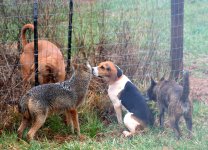Raspy
Veteran Member
- Joined
- Dec 16, 2006
- Messages
- 1,655
- Location
- Smith Valley, Nevada
- Tractor
- NH TC29DA, F250 Tremor, Jeep Rubicon
Randy,
I'm thinking it would be a good idea to get our next dog at a very young age. Just a few days old, like Sandy. Then make sure we introduce her to various influential events at the right time. Shooting, might be a good example, as Bei Bei cannot go plinking with me because she is so afraid of loud noises. Other examples might be, riding in the Jeep, being introduced to people, cats and other dogs etc. Plus just developing a bond very early.
In my reading and experience, it seems like dogs that are closer to the wild ones, like Akitas for instance, are less interested in pleasing humans and live more by their own code. They are great dogs, but live more as equals or more independently, or require a stronger leader. This was a trait we saw in Sandy. We all got along perfectly well, but she wasn't interested in doing tricks, and conversely, we learned from her and helped her. Again, as I've tried to convey, we were a family with diverse members.
It might be hard to find someone with pups that would let one go at a few days old though. I'll just have to get them to read about Sandy first. Heee heee heee. With the normal timing of 8-12 weeks to get a puppy, it seems like a lot of valuable time has been lost.
How old were your dogs when you got them?
You've mentioned Weasel before and how he moves away from the things he gets fed up with. Nice trait. I think you mentioned how much he hates to be brushed and has to go be alone a bit, then comes back to tell you he forgives you. Funny.
I really enjoy hearing about them and realizing they have become such good and trusted family members with so much personality.
I'm thinking it would be a good idea to get our next dog at a very young age. Just a few days old, like Sandy. Then make sure we introduce her to various influential events at the right time. Shooting, might be a good example, as Bei Bei cannot go plinking with me because she is so afraid of loud noises. Other examples might be, riding in the Jeep, being introduced to people, cats and other dogs etc. Plus just developing a bond very early.
In my reading and experience, it seems like dogs that are closer to the wild ones, like Akitas for instance, are less interested in pleasing humans and live more by their own code. They are great dogs, but live more as equals or more independently, or require a stronger leader. This was a trait we saw in Sandy. We all got along perfectly well, but she wasn't interested in doing tricks, and conversely, we learned from her and helped her. Again, as I've tried to convey, we were a family with diverse members.
It might be hard to find someone with pups that would let one go at a few days old though. I'll just have to get them to read about Sandy first. Heee heee heee. With the normal timing of 8-12 weeks to get a puppy, it seems like a lot of valuable time has been lost.
How old were your dogs when you got them?
You've mentioned Weasel before and how he moves away from the things he gets fed up with. Nice trait. I think you mentioned how much he hates to be brushed and has to go be alone a bit, then comes back to tell you he forgives you. Funny.
I really enjoy hearing about them and realizing they have become such good and trusted family members with so much personality.
